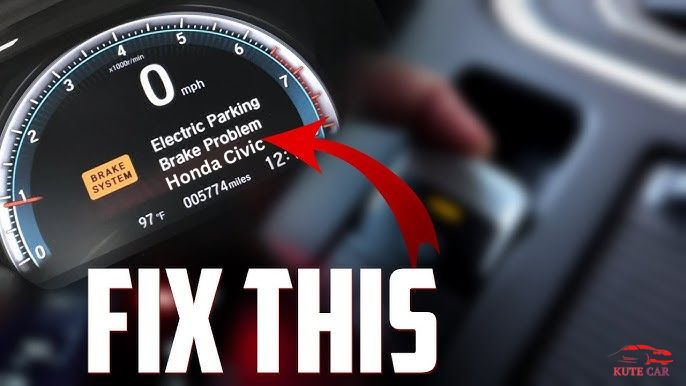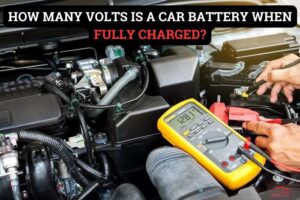The alluring plan, exceptional mileage, and in general execution of the Honda Urban make it a popular and reliable car. However, even the most reliable cars can have issues, and some Honda Civic models have several problems with the braking systems. Since a vehicle’s brakes are one of the main security highlights, you should know about any potential issues that could seriously endanger you or your travelers. We will examine the most common issues with the electric parking brake problem Honda Civic and the steps you can take to fix them in this article.
In this way, lock-in, and we should investigate the Honda Metro stopping mechanism issue. When a Honda Civic doesn’t start, the brakes probably are to blame. You will need to remove the electronic parking brake fuse.
What Causes a Electric Parking Brake Problem Honda Civic
Numerous automobile manufacturers worldwide currently use the electric parking brake. The old method, in which you had to pull the lever up or down to engage or release the parking brake, would soon be replaced by this simple system. The Honda City has another electric handbrake that can be initiated and deactivated with the press of a button.
Be that as it may, this new innovation has intrinsic issues vehicle proprietors face. The causes vary, yet the most widely recognized ones incorporate the accompanying:
1. Dead Battery
In contrast to the conventional lever handbrake, the electric parking brake system is not mechanical. It uses power from the battery to turn on the actuators and take commands from the driver. If the battery doesn’t supply sufficient current, the framework neglects to drive the servo engines that lock the wheel when you actuate the brake switch.
The EPB error message is shown on the information display after the car’s computer recognizes that as a problem. Using a digital multi-meter, check the battery and measure the voltage across the terminals. You should get a reading of at least 12.6V for a car battery in the best condition.
2. Parasitic Battery Discharge
Parasitic battery release happens when you leave the vehicle. After turning off the engine, accessories left frequently running cause it. These include headlights, trunk lighting, relay switches, and under-hood or glove compartment lighting. Electrical shorts caused by defective sensors can also deplete your battery’s power.
When you park your Honda Civic for an extended period, typically overnight, the EPB issue brought on by parasitic battery drain frequently occurs. The battery becomes insufficient to power the servo motors used to release the brake pads.
The arrangement is generally to guarantee that all gadgets in your vehicle are switched off before you leave. Additionally, a short circuit should be used to examine any defective component to prevent parasitic battery drain.
3. Faulty Wiring or Blown Fuse
The circuits that connect the EPB switch, control module, and actuators make up an electric parking brake system. An issue happens if any is shorted or opened. The EPB system is also cut off from power when a fuse blows.
Examine blown fuses and worn-out or loosely connected wires. Additionally, address any identified issues by checking the clips or connectors that attach various components, such as the servo motors and center console.
Troubleshooting of Electric Parking Brake Issues in Honda Civic
- Check warning lights.
- Verify brake release.
- Check battery.
- Check brake fluid level.
- Clear obstructions.
- Reset parking brake.
- Scan for error codes.
- Consult a professional.
Steps to Diagnose Electric Parking Brake Issues
Here are the advanced steps:
- Scan for any stored error codes or trouble codes.
- Monitor the data parameters related to the brake actuator, motor, position sensors, and switch inputs.
- Monitor the actuator operation for any unusual noises, vibrations, or lack of movement.
- Recalibrates the position sensors that determine the status and position of the parking brake.
- Look for any damaged wires, loose connections, or corrosion. Use a multimeter to check for continuity and proper voltage at various points in the circuit.
- Use a multimeter or specialized electrical testing equipment to measure the voltage and current of the electric parking brake system.
- Test individual components such as the parking brake switch, actuator motor, position sensors, and control module.
- Perform a system reset or reprogramming of the electric parking brake system.
Honda civic electric parking brake problem- How to fix it?
You must replace the car’s battery, alternator, or blown fuse to resolve the issues. The electric parking brake must be thoroughly cleaned, lubricated, and adjusted cable tension. Additionally, you should determine whether the brake pads are worn. To ensure your vehicle runs properly, replace them if worn out.
1) Replace a Car Fuse
Supplanting a vehicle combined is quick once you know where to look. To start with, counsel your proprietor’s manual for the area of the fundamental circuit enclosing your vehicle. This could be anywhere from under the controlling wheel or dashboard to inside or behind the glove compartment. There may likewise be different breaker enclosures found at various spots around your motor sound.
2) Replace the Battery
Although changing a car battery can be a simple process, it’s essential to understand the fundamentals first. The primary step is ensuring you have the correct trade battery for your vehicle. Look at your proprietor’s manual or ask an auto specialist for an exhortation on choosing the right size and limit regarding your necessities.
3) Replace the Alternator
Supplanting an alternator might appear scary, but with suitable devices and a touch of skill, it doesn’t need to be. Before starting this work, ensure you have every one of the vital apparatuses and new parts close by. A new alternator, socket wrenches, screwdrivers, pliers, wire cutters/crimpers, and an optional automotive voltage tester are typically required.
To begin, detach the negative cable from the battery in your vehicle. This is important for safety reasons because electricity can sometimes still flow through even when the power is off. Use your socket wrench set or a screwdriver to loosen the alternator’s mounting brackets.
How do you reset the electric parking brake problem of Honda Civic?
The Honda civic electric parking brake problem must be reset so that the dashboard light goes out after any issues have been resolved. This is the way you reset it:
- Ensure the gears are in “park,” and turn on the ignition with your foot on the brake pedal. Don’t eliminate your foot from the foot brake.
- Pull the EPB (electronic stopping brake) button up and afterward discharge it.
- Then, press and hold the EPB button until you hear a sound by pulling it up once more.
- Now, press and hold the EPB button for three seconds.
- You can release it when you hear two beeps.
Conclusion
The electric stopping brake is a significant security highlight in current Honda Civics. The primary role of this framework is to keep your Honda from moving when stopped. Be that as it may, similar to everything electrical, it is entirely expected for electrically controlled vehicle parts to foster deficiencies – driving for this situation to the frequently misjudged Honda Urban electric leaving brake blunder. We are hoping that this electric parking brake problem of Honda Civic is going to be solved with this Informative article.




